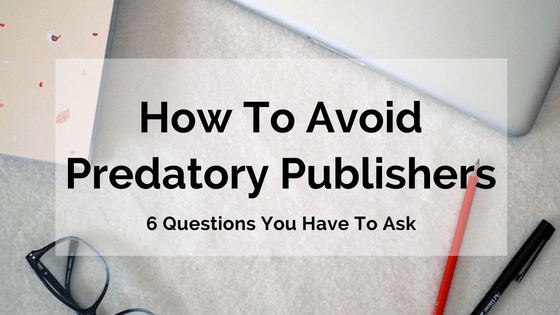For many writers, publication can seem like the ultimate prize. Many anticipate the wondrous moment when a publisher will finally say “yes” – launching their careers and justifying years of hard labour.
But the publishing industry, like all industries, does have a few predators, which budding writers would do best to avoid. These “publishers” may not actually publish books at all. Or they may publish and sell books, but trap inexperienced writers in unfavourable contracts.

It is important that new writers enter the industry with eyes open, and know what questions to ask. In this article, we’ll delve into the facts and questions that will help writers spot predatory “publishers” and/or predatory contracts.
Before we dive in, let’s take a refresher course on the different publishing models that exist today.
Models of publishing
While the publishing model alone is not enough to provide insight into the integrity of the publisher, understanding what each model offers can really help new authors.
There are three basic models of publishing:
- Traditional/Trade Publisher – these publishers make an investment in a writer and their work. They receive the rights to sell a book in exchange for covering all aspects of editing, publication, marketing, and distribution. Their income is earned from book sales, with the writer earning their share through royalties.
- Vanity/Subsidiary Publishers – make their income from writers’ fees and from a percentage of sales. It is in this category that many predatory publishers fall. Their business model is based on charging potential writers as much as they can for as many services (such as editing and marketing) as they can sell and also withholding a percentage from sales.
- Self-Publishing – offers writers the chance to publishing their work for a fee. The income is earned mainly from fees, but there are many different types of self-publishing models. Some are honest and transparent businesses providing a great service. Others are not and do not.
Have a look here for more on this, as well as a few case studies of evil. An additional note is that the term “vanity publisher” is a bit dated. These days, predatory publishers go by many names and do their best to convince writers they are legit. Look at what they do, not at what they call themselves.
It is also true that both great and terrible publishers can fall under any of the above categories. So how can you tell whether you’re signing up with a legitimate publisher that will treat you right as an author?
The following six questions will help any writer make an informed decision about a potential publisher.

1. What is the publisher’s selection process?
As publishing is an expensive enterprise, legitimate publishers are highly selective. They will make a significant investment in a writer and will only publish the writers they believe in. This investment means that these publishers have a vested interest in how well the book does, and they will support the writer in their publishing journey.
Publishers that publish every manuscript that comes their way should be approached with caution. Publishers that publish every manuscript that comes their way for a hefty fee should be approached with pepper spray.
Ask them about their selection process, and listen out for nonsense. Unclear or vague responses are not a good sign. Answers from legitimate publishers will, of course, vary. A large commercial publisher may only publish books they are certain will sell. A small independent press may very well say “we publishing books we fall in love with”.
Find out how often they fall in love – ask how many books they published last year (10,000 infatuations would be a bad sign). Most importantly, do your own research. Even a quick online search will reveal a lot. Make sure you check out their website – if it looks and reads like a perfume ad, be wary.

2. How is the publisher making their money?
Publishing is a business and publishers are perfectly entitled to seek a profit. HOW the publisher is making that profit, however, can be very telling.
Legitimate publishers make their profit by investing in and selling intellectual property (i.e. books).
Predatory publishers, as mentioned above, make their money from writers’ fees, while also demanding a percentage from sales. The fees could be for editing, typesetting, design, marketing, or distribution. Often, these services are either not delivered or delivered to a sub-standard quality.
The main point is this: when a publisher accepts a book for publication they are making an investment. It is expected that they will recover the costs of this investment and earn a profit from the sales of your book.
Scam publishers make no investment in the publication – which is paid for by the writer – but will still withhold a percentage from sales.
The main red flag item would be that unless it is explicitly vanity publishing and the prospective author is aware of this and enters the relationship willingly, the author should not be paying the publisher any money to publish their work. The financial risk should be carried by the publisher.” – Georgina Richter at Fremantle Press.
This is the main difference between legitimate self-publishing and scams. In true self-publishing the writer knows what they are paying for. Generally, this is the publication (print or electronic) of their work. The writer is responsible for editing, marketing, etc.
The publisher, which is more of a printer, expects no further returns beyond the initial publication fee. (Some online publishing platforms may allow you to publish for free, and charge a percentage of sales, but they are a whole other story.)
There are many benefits of self-publishing, but it is important that the publisher is transparent about exactly what service they are providing.

3. Is the publisher affiliated with other fee-charging businesses?
This is the oldest trick in the scam publisher’s hypothetical book – accept a writer and then refer them onto Blogs Editorial or Shmogs Marketing.
The warning sign is if your publisher pressures you to employ certain agencies for services you are expected to pay for, but which the publisher themselves should cover.
What a traditional publisher should cover
Cost of reading your manuscript
You should never be charged a “reading fee” for a publisher to read your manuscript. Even if it is presented as “nominal” or to “cover administrative costs”.
Publishers and agents are paid to do their job, and reading is part of that job. Charging writers reading fees is like a supermarket charging shoppers a viewing fee before they can buy their tomatoes.
Editing and copyediting
The first step in the editing process is, generally, editorial comments. The purpose of this is to tighten up your story and make sure it flows well and makes sense. An editor may suggest you add, delete, or rewrite certain sections. A good editor will make this a collaborative process, giving the writer a fair opportunity to respond to suggestions.
The final step involves copyediting, which is just about syntax, grammar, punctuation, and stylistic consistency. It is the responsibility of the publisher to pay for these services.
Typesetting, cover design, formatting
Basically all aspects related to getting the manuscript ready for publication (both print and electronic). Please note that the writer will have little input in these areas. While the publisher might ask for your feedback on, say, the cover, the final decision is up to them.
While it might take the writer some getting used to, this is for the purpose of ensuring consistency and marketability.
Marketing
While a small publisher is unlikely to have a massive marketing budget, they will contribute towards certain parts of it. They will also have some kind of marketing plan.
Most importantly they will have industry contacts, and will be able to assist with things such as getting your book reviewed.
Distribution
Any publisher worth its salt will have a clear plan for distribution. They will be able to explain where and how your book will be distributed, as well as being able to give you an indication of how many copies they expect to sell in the first year. Always ask about foreign markets too.
Be wary of literary agencies that contact you out of the blue, and pass you on to a fee-charging publisher.
In fact, unless you happen to be a celebrity or an already established writer, also be wary of publishers contacting you out of the blue. While you may have written a masterpiece, this kind of unsolicited attention tends to come with a hefty price tag.

4. Does the contract pass the sniff test?
Contracts are a very complicated business. Even legitimate publishers have been known to offer writers disadvantageous contracts. Most of us are not contract lawyers – but there are certain clauses that should still raise the alarm.
Remember that once you have signed over the rights to your book to a publisher, you are bound to them. Getting trapped in a predatory contract means that the rights to your work will belong to them (potentially for ever and ever).
The following points should be considered even if you are dealing with the most well-respected publisher in the universe. Finding a couple of these in your contract might not be cause to run away screaming into the night (thought you may wish to negotiate). Finding ALL of these would be.
Contract alarm bells and warning signs
- No contract at all = run, screaming, night. This is a particular risk if you are dealing with a small press, which may or may not be run by your mates or some nice guys you met down the pub. They might be perfectly honest and reasonable. You should still ask for a contract. At the very least it will help clarify certain expectations.
- No advance. While most first-time writers are unlikely to get a massive advance, even a token amount can demonstrate that the publisher is serious.
- As a rule of thumb, you should earn higher royalties for electronic rights – there are fewer costs involved in electronic publication and this should be reflected.
- Be wary of blatant rights grab – if the publisher demands the exclusive right to print, publish, sell and license the book, in every possible format, in whole or in part, in every language, in the entire world, for the full term of copyright.
- Odd or vague clauses about what the publisher will actually pay for. Basically, anything that allows the publisher to accrue random costs and transfers these costs onto the writer.
- You get no free copies of your own book. Author copies are something all legitimate publishers should provide.
- You are expected to buy a certain amount of copies of your own book. No legitimate publication contract will require you to purchase any amount of copies of your book.
- You are expected to give the publisher first option on your next book, on the same terms. Obviously if you are selling a series the publisher has the right to expect all the novels. But any publisher that expects to have first dibs on future work, without proper negotiation, should be approached with caution.
- Jargon without clear definitions. While you should expect some legal/industry jargon in a contract, the publisher should be able to provide clear explanations. And it is your right to ask as many questions as you need.
For more on predatory contracts – and what to look out for – have a look at this post by John Scalzi.

5. Has the publisher actually published anyone else?
Do your research and don’t just take the publisher’s word for it. Find copies of books they have published – both in print and electronically – and see how professional they look and feel. Contact the writers and ask them about their experience.
Remember that even a perfectly legit publisher might, on closer inspection, prove to be a bad fit for you. A publisher will have their own identity, and it’s important that this identity is compatible with your work.
Consider the feel and look of their books. Do they appeal to a specific market, and is that market right for you?
This brings us neatly onto the topic of markets. First-time writers generally feel uncomfortable viewing their baby as a product. But, from the perspective of a publisher, this is exactly what your book is.
This doesn’t detract from the profoundness of your work or the magnitude of your genius – it is simply a question of perspective.
A publisher’s job is to sell books. In order to do this, they need to know their market and place themselves strategically.
As a writer, once you venture into the realm of publishing, you must be aware of this perspective. Consider the best market for your own work, and make sure a potential publisher has access to that market.
Let’s say, for example, you are a writer of erotic science fiction involving dinosaurs (an actual thing). Publishers of erotic fiction, or publishers with an erotic fiction imprint, might be a good fit for you. Your work may also appeal to palaeontologists.
Ask your potential publisher about their success in and experience with your ideal market.
If your publisher is brand new, and has yet to actually publish anyone, find out what type of market they are considering. At the very least, they should have a clear idea of this as part of their business plan (again: publishing is a business).
The goal here is to get a clear sense of how professional they are. A good publisher (even a new one) will know their industry.
Google your potential publisher. Seriously – google the hell out of them. Google their staff, google their board (if they have one), google their writers. If you find horror stories, do not ignore these.

6. Is the publisher promising too much/not enough?
Any publisher who assures you that they will turn your book into a bestseller is promising too much. If their only commitment is to publish your novel on amazon.com – for a fee, of course – they are short-changing you.
A publisher should also have expectations of its writers. Asking that the writer be actively involved in the editing and marketing process is fair, reasonable, and professional. But publishers should be able to provide clear answers to the following questions:
- What is the editing process?
- What is the publication date?
- What is the marketing plan?
- How will the book be distributed?
In addition to the massive fees scam publishers charge, there are other risks:
- Publication will be unprofessional – which will do damage a budding writer’s reputation.
- Novel won’t be published at all.
- Novel won’t be published AND will be contractually locked away with the publisher.
The key to a happy writer-publishing relationship is strategic cooperation. Ultimately, you both wish to make the book a success.
The best way to achieve this is by each party focusing on doing what you do best. You should expect a publisher to play their part and be professional.
There’s also the issue of copyright…
The author should retain copyright of their creative work. They should also retain control over any editing done, signing off on each stage of the process, including page proofs, before the work goes to print.” – Georgina Richter at Fremantle Press.
***
There are no shortcuts to becoming a published writer. It takes hard work and commitment, and success is not guaranteed. Your best option is writing and re-writing (and re-writing yet again) the best damned novel you can. Once this is done, approach the publishing business as a business.
Put your business socks on and set aside your fragile writer’s ego. We are all vulnerable in our creative work – we have to be. But publishing is separate from the creative process. Being a good writer and navigating the publishing world require different skills.
When in doubt, pretend (in your own head) that you are your own agent. Look at yourself as a client and ask the kind of questions you would ask if it wasn’t your precious baby on the line.
First-time writers can be uncertain and grateful for any attention – but remember that you are bringing something valuable to the table. Don’t be afraid to ask questions and demand a reasonable return for all your hard work.
One response to “6 Questions To Help You Avoid Predatory Publishers”
Thank you for this invaluable information I have a manuscript almost ready for publication and will be in touch.